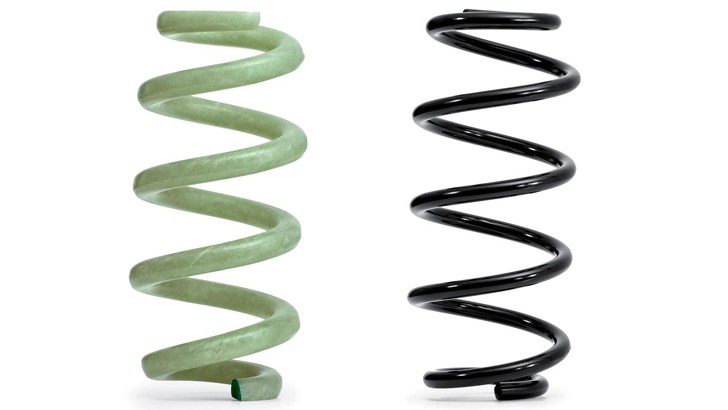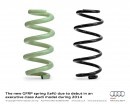Earlier this year, Audi introduced a fuel-efficient sub-brand for the A4, A5 and A6 called “ultra,” and it looks like it could have one more trick up its sleeve in the name of maximizing fuel economy. To cut as much weight as possible from its cars, Audi has announced plans to install a new set of glass fiber-reinforced polymer (GFRP) suspension springs for use on its upcoming vehicles.
Although Audi didn’t go as far as to say which car this technology will debut on, the press release confirmed that it will be part of the German automaker’s “ultra” program and “will appear in an executive class Audi model before the end of the year.” The GFRP springs weigh just 40 percent of what conventional steel springs weigh. To put this into actual numbers, each GFRP spring weighs 1.6 kilograms (3.5 pounds) compared to a steel spring, which weighs 2.7 kg (almost 6 pounds). In total, these new spring will help shave 4.4 kilograms (9.7 pounds from the overall curb weight, and about half of that comes out of the car’s unsprung weight.
“The GFRP springs save weight at a crucial location in the chassis system. We are therefore making driving more precise and enhancing vibrational comfort,” said Dr. Ulrich Hackenberg, Member of the Board of Management for Technical Development at AUDI AG.
In addition to weight reduction, Audi says that the construction of these new GFRP springs is a greener process that requires less energy than producing steel springs. The core of the GFRP spring is just a few millimeters in diameter and it consists of fibers that twisted and bonded together with epoxy resin. Additional fibers are then wrapped around the core at varying angles to increase the strength and the entire spring assembly is then cured at high temperatures.
Audi claims that the GFRP springs can be more finely tuned to a specific application, and the material does not corrode or affected by harsh chemicals.
“The GFRP springs save weight at a crucial location in the chassis system. We are therefore making driving more precise and enhancing vibrational comfort,” said Dr. Ulrich Hackenberg, Member of the Board of Management for Technical Development at AUDI AG.
In addition to weight reduction, Audi says that the construction of these new GFRP springs is a greener process that requires less energy than producing steel springs. The core of the GFRP spring is just a few millimeters in diameter and it consists of fibers that twisted and bonded together with epoxy resin. Additional fibers are then wrapped around the core at varying angles to increase the strength and the entire spring assembly is then cured at high temperatures.
Audi claims that the GFRP springs can be more finely tuned to a specific application, and the material does not corrode or affected by harsh chemicals.

